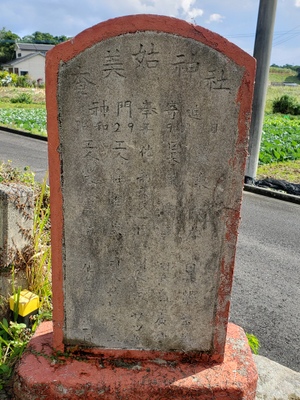Difference between revisions of "Amamikyo"
| Line 4: | Line 4: | ||
Amamikyo is the primary primordial creation goddess in [[Ryukyuan religion|Ryukyuan origin myths]]. Along with her male counterpart [[Shinerikyo]], Amamikyo is credited with creating the [[Ryukyu Islands]] themselves, as well as numerous ''[[gusuku]]'' and ''[[utaki]]'' (sacred sites),<ref>Sites which Amamikyo is credited with creating include [[Tamagusuku gusuku]], [[Goeku gusuku]], and [[Iso gusuku]], among many others. Only four ''gusuku'' are explicitly associated with Amamikyo in the ''[[Omoro soshi|Omoro sôshi]]'', however. Kitahara Shûichi. ''A Journey to the Ryukyu Gusuku'' 琉球城紀行。 Naha: Miura Creative, 2003. pp66-67, 89.; Smits, ''Maritime Ryukyu'', 125-126.</ref> and with introducing rice cultivation and other technologies. | Amamikyo is the primary primordial creation goddess in [[Ryukyuan religion|Ryukyuan origin myths]]. Along with her male counterpart [[Shinerikyo]], Amamikyo is credited with creating the [[Ryukyu Islands]] themselves, as well as numerous ''[[gusuku]]'' and ''[[utaki]]'' (sacred sites),<ref>Sites which Amamikyo is credited with creating include [[Tamagusuku gusuku]], [[Goeku gusuku]], and [[Iso gusuku]], among many others. Only four ''gusuku'' are explicitly associated with Amamikyo in the ''[[Omoro soshi|Omoro sôshi]]'', however. Kitahara Shûichi. ''A Journey to the Ryukyu Gusuku'' 琉球城紀行。 Naha: Miura Creative, 2003. pp66-67, 89.; Smits, ''Maritime Ryukyu'', 125-126.</ref> and with introducing rice cultivation and other technologies. | ||
| − | While some myths assert that she first came down to earth at [[Kudaka Island]] and then crossed over to [[Okinawa Island]] at [[Sefa utaki]] - hence these two sites being the most sacred sites on/near Okinawa - others relate the story of the creation of the world, then the islands, then the ''utaki'' and ''gusuku'', in a narrative progression moving from north to south. Scholars such as [[Gregory Smits]] have tied this legendary southward progression to actual historical migration of peoples southward from the [[Amami Islands|more northerly islands]] into Okinawa, bringing with them cultural customs as well as technologies such as iron working and rice agriculture.<ref>Smits, ''Maritime Ryukyu'', 125.</ref> Some have gone so far as to suggest that the name of the deity itself may derive from, or literally mean, "a person" or "people" from "Amami".<ref>The goddess is often called Amamichu in the [[Okinawan language]]; in that same language, a person from Amami would be called ''Amaminchu''. "[https://ryukyushimpo.jp/okinawa-dic/prentry-40119.html Amamikyo]," ''Okinawa Compact Encyclopedia'', Ryukyu Shimpo, 2003.</ref> | + | While some myths assert that she first came down to earth at [[Kudaka Island]] and then crossed over to [[Okinawa Island]] at [[Sefa utaki]] - hence these two sites being the most sacred sites on/near Okinawa - others relate the story of the creation of the world, then the islands, then the ''utaki'' and ''gusuku'', in a narrative progression moving from north to south. Legends in northern Okinawa assert that [[Asumui utaki]]<!--安須森御嶽-->, a sacred grove at the northern tip of Okinawa, [[Hedo no misaki]], was the first such sacred grove she created.<ref>Smits, ''Maritime Ryukyu'', 152.</ref> Scholars such as [[Gregory Smits]] have tied this legendary southward progression to actual historical migration of peoples southward from the [[Amami Islands|more northerly islands]] into Okinawa, bringing with them cultural customs as well as technologies such as iron working and rice agriculture.<ref>Smits, ''Maritime Ryukyu'', 125.</ref> Some have gone so far as to suggest that the name of the deity itself may derive from, or literally mean, "a person" or "people" from "Amami".<ref>The goddess is often called Amamichu in the [[Okinawan language]]; in that same language, a person from Amami would be called ''Amaminchu''. "[https://ryukyushimpo.jp/okinawa-dic/prentry-40119.html Amamikyo]," ''Okinawa Compact Encyclopedia'', Ryukyu Shimpo, 2003.</ref> |
{{stub}} | {{stub}} | ||
Revision as of 06:54, 6 February 2020

- Japanese: 奄美姑・阿麻弥姑 (Amamiko, Amamikyo; Amami language: Amamiku, Amamikyu; Okinawan language: Amanchu, Amamichu)
Amamikyo is the primary primordial creation goddess in Ryukyuan origin myths. Along with her male counterpart Shinerikyo, Amamikyo is credited with creating the Ryukyu Islands themselves, as well as numerous gusuku and utaki (sacred sites),[1] and with introducing rice cultivation and other technologies.
While some myths assert that she first came down to earth at Kudaka Island and then crossed over to Okinawa Island at Sefa utaki - hence these two sites being the most sacred sites on/near Okinawa - others relate the story of the creation of the world, then the islands, then the utaki and gusuku, in a narrative progression moving from north to south. Legends in northern Okinawa assert that Asumui utaki, a sacred grove at the northern tip of Okinawa, Hedo no misaki, was the first such sacred grove she created.[2] Scholars such as Gregory Smits have tied this legendary southward progression to actual historical migration of peoples southward from the more northerly islands into Okinawa, bringing with them cultural customs as well as technologies such as iron working and rice agriculture.[3] Some have gone so far as to suggest that the name of the deity itself may derive from, or literally mean, "a person" or "people" from "Amami".[4]
References
- Gregory Smits, Maritime Ryukyu, University of Hawaii Press (2019), 125.
- ↑ Sites which Amamikyo is credited with creating include Tamagusuku gusuku, Goeku gusuku, and Iso gusuku, among many others. Only four gusuku are explicitly associated with Amamikyo in the Omoro sôshi, however. Kitahara Shûichi. A Journey to the Ryukyu Gusuku 琉球城紀行。 Naha: Miura Creative, 2003. pp66-67, 89.; Smits, Maritime Ryukyu, 125-126.
- ↑ Smits, Maritime Ryukyu, 152.
- ↑ Smits, Maritime Ryukyu, 125.
- ↑ The goddess is often called Amamichu in the Okinawan language; in that same language, a person from Amami would be called Amaminchu. "Amamikyo," Okinawa Compact Encyclopedia, Ryukyu Shimpo, 2003.